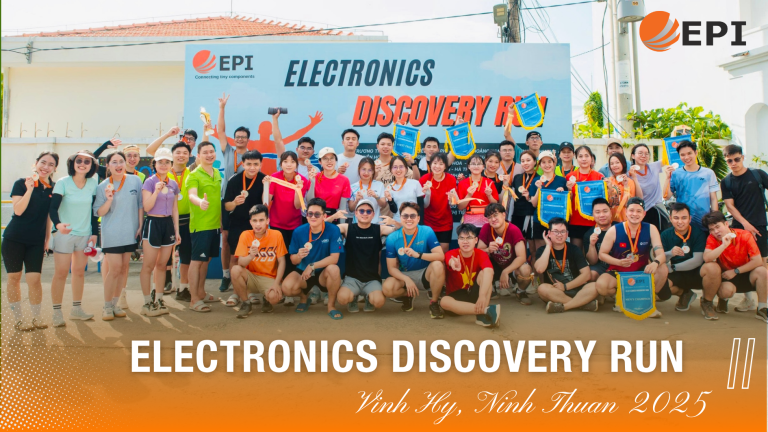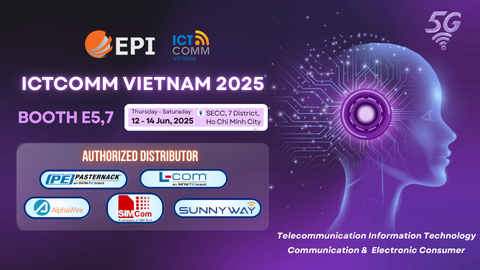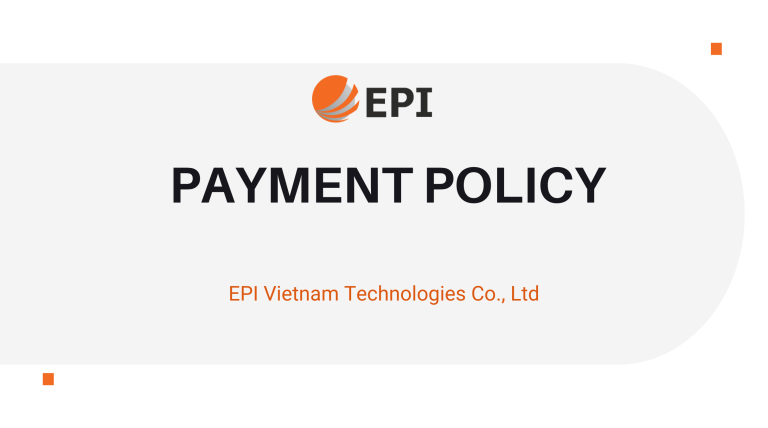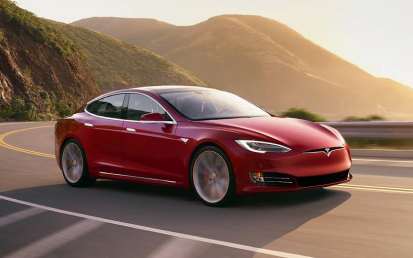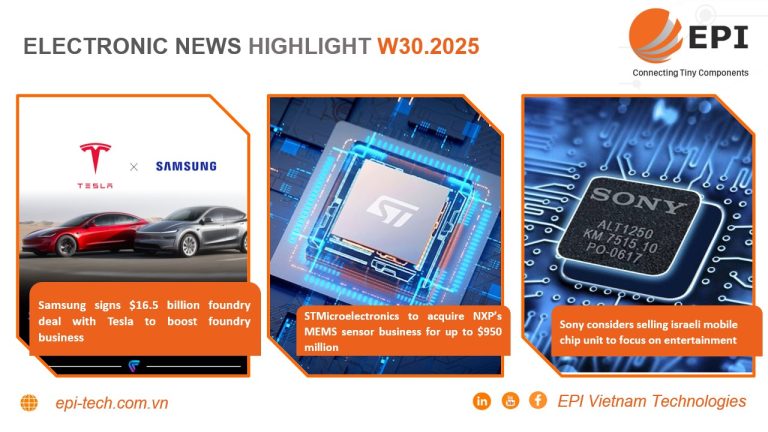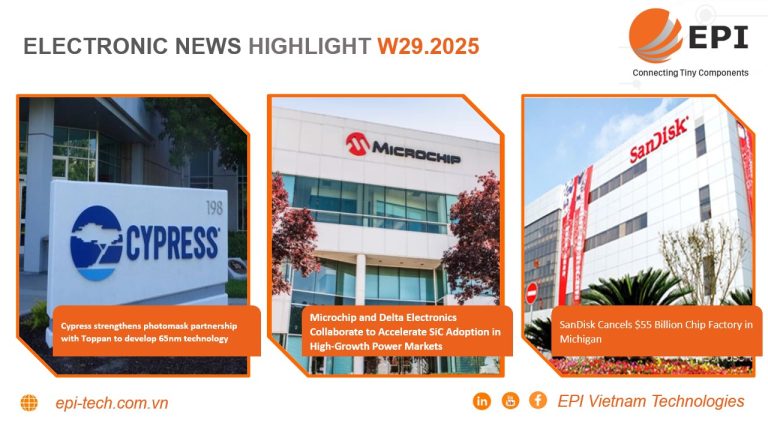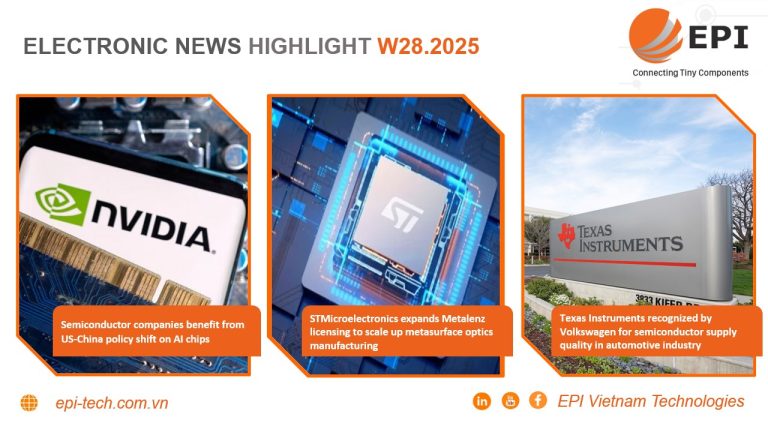ELECTRONICS NEW HIGHLIGHT W22.2025

1. Wolfspeed Nears Bankruptcy as Silicon Carbide Chipmaker Struggles with Financial Difficulties
Silicon carbide chip manufacturer Wolfspeed is preparing to file for Chapter 11 bankruptcy protection after failing to resolve its financial burdens.
The move comes as the company faces ongoing weakness in automotive and industrial demand, coupled with trade-related uncertainties. Wolfspeed has rejected multiple creditor proposals for out-of-court restructuring but now expects to make a formal filing with support from the majority of its lenders.
In early May 2025, the company warned of going concern risks and cut its fiscal 2026 revenue forecast to $850 million—significantly below analysts’ estimates of $958.7 million.
As one of the industry’s leading suppliers of SiC devices, Wolfspeed’s potential bankruptcy could disrupt supply chains across power electronics and electric vehicles sectors. The company declined to comment.
Learn more: Wolfspeed Nears Bankruptcy as Silicon Carbide Chipmaker Struggles with Financial Difficulties
2. Japan’s Chip Factory Deployments Slow Down as Non-AI Demand Weakens
Japan’s efforts to revive its semiconductor industry are losing momentum, with only three of seven new chip factories entering mass production by April 2025. This delay highlights sluggish global demand for non-AI semiconductors.
Japan has committed more than 9 trillion yen ($62 billion) to increase domestic chip production by 2029, aiming to support next-generation manufacturing and reduce reliance on imports. However, production ramp-up remains slow at present.
Renesas reopened its Kofu plant in April 2025 after nine years of closure but postponed full-scale production due to weak demand for power semiconductors in electric vehicles. Rohm began trial production at a site acquired in 2023, while Sanken Electric delayed production for two years until 2026 or later. Memory supplier Kioxia plans to activate a new plant when the market recovers.
TSMC’s first chip factory in Japan started production in December 2024, but sources say utilization remains modest. The company has postponed plans for a second factory initially expected to begin construction in fiscal 2024.
Japan also faces a widening technology gap. While global leaders have moved to 2nm processes, Japan’s production remains at 12nm or larger nodes. Most domestic companies operate at 40nm or above. According to Omdia, Japan’s share of the global chip market fell to 7.1% in 2023, the lowest since the 1980s.
Weak demand for non-AI chips is not just a domestic issue. The U.S. market is also soft, and potential new chip tariffs under Donald Trump’s proposed policies could add further pressure.
Learn more: Japan’s Chip Factory Deployments Slow Down as Non-AI Demand Weakens
3. TDK Accelerates Shipment of Thinner Silicon Batteries for AI Smartphones
Japan’s TDK Corporation will begin shipping its third-generation silicon anode batteries by the end of June, ahead of the original schedule in Q3. These batteries are designed to support thinner smartphones with advanced AI features, reflecting growing demand for high-density energy solutions in the mobile sector.
According to CEO Noboru Saito, the new batteries replace traditional graphite with silicon, increasing energy capacity by about 15% within the same volume. This improvement allows manufacturers to develop thinner devices without compromising battery life.
Major smartphone brands are expected to adopt the new battery format soon. While TDK has not disclosed specific customers, both Apple and Samsung—each contributing about 10% of TDK’s revenue—are launching thinner models such as the upcoming Galaxy S25 Edge and iPhone 17 Air.
TDK’s battery subsidiary, Amperex, currently dominates the small silicon battery segment and is expanding its manufacturing footprint. A new plant in India will start production in September 2025, enabling flexible capacity between graphite and silicon battery lines. Saito noted that customer demand will determine the production balance between China and India.
Beyond smartphones, silicon battery technology is also applied to a range of products from wearables to electric vehicles. TDK plans to launch its fourth-generation silicon batteries in the next fiscal year to strengthen its market leadership.
Learn more: TDK Accelerates Shipment of Thinner Silicon Batteries for AI Smartphones
#ASEAN #AsiaPacific #distributor #Global #electronicdistributor #PCBA



 English
English  Tiếng Việt
Tiếng Việt 





